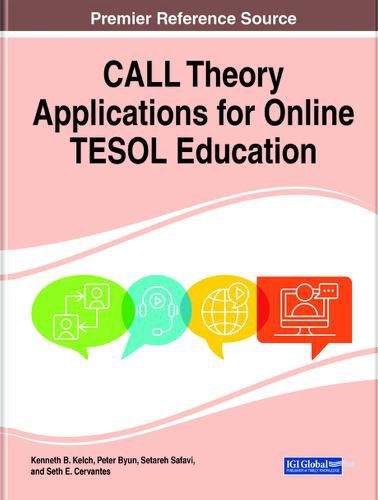Readings Newsletter
Become a Readings Member to make your shopping experience even easier.
Sign in or sign up for free!
You’re not far away from qualifying for FREE standard shipping within Australia
You’ve qualified for FREE standard shipping within Australia
The cart is loading…






This title is printed to order. This book may have been self-published. If so, we cannot guarantee the quality of the content. In the main most books will have gone through the editing process however some may not. We therefore suggest that you be aware of this before ordering this book. If in doubt check either the author or publisher’s details as we are unable to accept any returns unless they are faulty. Please contact us if you have any questions.
With the increased necessity of using online teaching to ensure students continue to learn, it is imperative that language teachers implement computer-assisted language learning (CALL) techniques into their teaching strategies. TESOL teachers especially must continue to remain up to date on the latest research outlining best practices for the online teaching of English language learners.
CALL Theory Applications for Online TESOL Education is a crucial reference work that focuses on online education and CALL in the context of teaching English to speakers of other languages. The book presents research that illustrates the current best practices in online CALL applications in TESOL including works on emerging applications such as mobile language learning, games, and service-learning. It includes chapters that focus on technology-enhanced learning in a variety of configurations, from fully online contexts to face-to-face blended learning contexts that have some degree of a virtual component. While highlighting topics that include e-learning, second language acquisition, and virtual learning environments, this book is ideal for TESOL educators and CALL practitioners who are interested in the ways in which language and culture are impacted by online education. Moreover, K-12 teachers and teacher educators working with linguistically and culturally diverse learners in their classes and communities, as well as administrators, academicians, researchers, and students will benefit from the research contained in this book.
$9.00 standard shipping within Australia
FREE standard shipping within Australia for orders over $100.00
Express & International shipping calculated at checkout
This title is printed to order. This book may have been self-published. If so, we cannot guarantee the quality of the content. In the main most books will have gone through the editing process however some may not. We therefore suggest that you be aware of this before ordering this book. If in doubt check either the author or publisher’s details as we are unable to accept any returns unless they are faulty. Please contact us if you have any questions.
With the increased necessity of using online teaching to ensure students continue to learn, it is imperative that language teachers implement computer-assisted language learning (CALL) techniques into their teaching strategies. TESOL teachers especially must continue to remain up to date on the latest research outlining best practices for the online teaching of English language learners.
CALL Theory Applications for Online TESOL Education is a crucial reference work that focuses on online education and CALL in the context of teaching English to speakers of other languages. The book presents research that illustrates the current best practices in online CALL applications in TESOL including works on emerging applications such as mobile language learning, games, and service-learning. It includes chapters that focus on technology-enhanced learning in a variety of configurations, from fully online contexts to face-to-face blended learning contexts that have some degree of a virtual component. While highlighting topics that include e-learning, second language acquisition, and virtual learning environments, this book is ideal for TESOL educators and CALL practitioners who are interested in the ways in which language and culture are impacted by online education. Moreover, K-12 teachers and teacher educators working with linguistically and culturally diverse learners in their classes and communities, as well as administrators, academicians, researchers, and students will benefit from the research contained in this book.